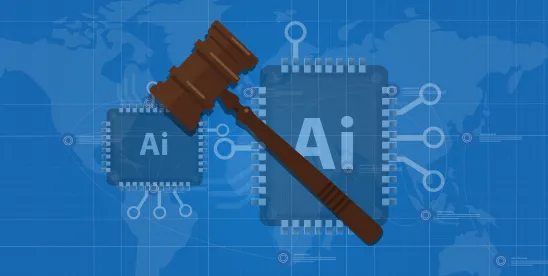The United States Patent and Trademark Office (USPTO) has issued a pivotal guidance document, effective April 11, on the use of Artificial Intelligence (AI) tools within patent and trademark practices. This guidance signals a significant advancement in the integration of this kind of technology in IP-related legal processes. It also underscores the USPTO’s commitment to both acknowledging the capabilities of AI and maintaining rigorous standards in the patent & trademark practice.
In essence, the guidance discusses the responsible incorporation of AI in patent and trademark practices, while emphasizing the importance of ensuring these advanced tools are governed within a stringent legal and ethical framework. Specifically, the guidance highlights:
- Ethical and Legal Adherence: It emphasizes the importance of integrating AI in a way that respects existing legal standards and ethical guidelines, particularly in the handling and protection of sensitive data.
- Accuracy and Verification: The guidance stresses that practitioners must thoroughly review AI-generated content to ensure its accuracy. This is crucial to avoid the submission of erroneous information, sometimes referred to as "hallucinations," which can result from AI processing errors.
- Data Security: Due to AI's ability to process vast and complex datasets, the guidance insists on stringent data protection measures to prevent unauthorized data breaches or exports.
- Continual Learning and Engagement: The USPTO advocates for ongoing education and dialogue through its AI and Emerging Technologies (ET) Partnership, which aims to keep policies aligned with the rapid advancements in AI technology.
- Professional Responsibility: Despite AI's potential to streamline the preparation of legal documents, the guidance clarifies that the ultimate responsibility for the accuracy and reliability of submissions remains with the practitioners.
The integration of AI tools into the legal domain is not without its complexities, particularly concerning the accuracy of AI-generated content and the protection of sensitive data. The USPTO’s latest guidance addresses these issues head-on, affirming that the existing legal and regulatory frameworks are robust enough to mitigate the risks associated with AI technologies. This reassurance is crucial for legal professionals who must navigate the evolving landscape of tech-enhanced legal processes while upholding the integrity of their work.
For patent & trademark practitioners, the guidance clarifies the expectation that while AI can significantly aid in the preparation of legal documents and filings, the technology does not diminish the practitioner's responsibility to ensure the accuracy and reliability of their submissions. The USPTO mandates a thorough review and verification of all AI-generated documents to prevent any potential legal missteps caused by AI errors, sometimes referred to as “hallucinations” or inaccuracies in the generated content.






 />i
/>i
